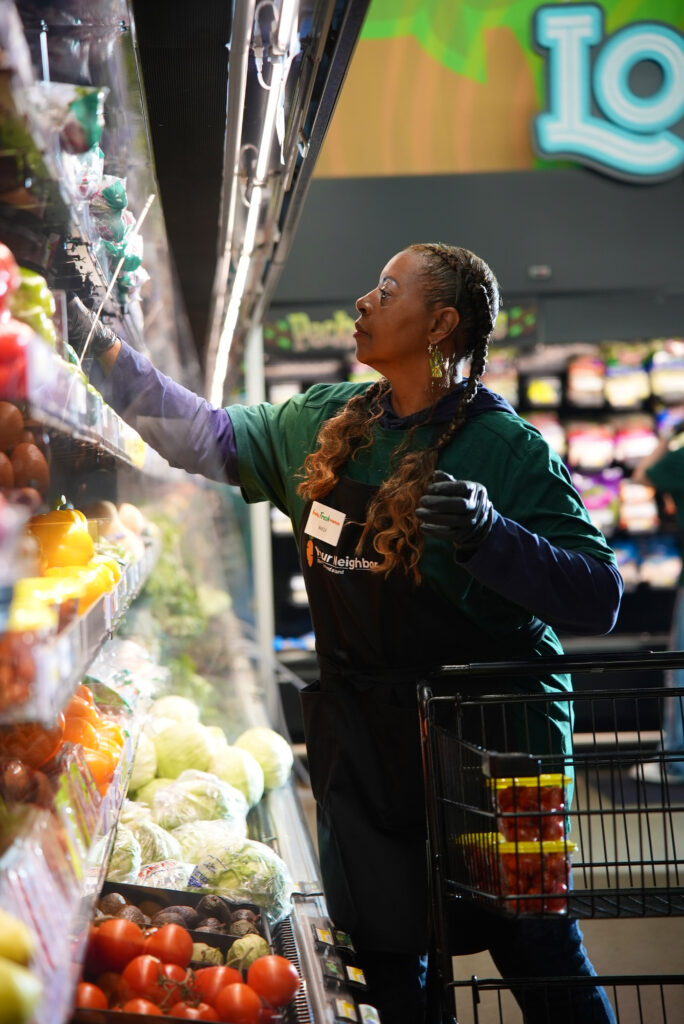Central Indiana’s Hunger Challenge Demands a Regional Response
Written by Jeff Bennett, Chief Innovation Officer
Even before October’s freezes in SNAP funding and July’s federal cuts to the USDA, a significant portion of Central Indiana Hoosiers lacked consistent access to healthy food.
That is the major finding of the recently published 2025 Survey of Food Assistance Need in Central Indiana, a new and expanded version of the biannual study put out by Indy Hunger Network. The 2025 study (compiled in partnership with the IU O’Neill School, CICF, and the Indianapolis Office of Public Health and Safety) surveyed 1,300 households across all nine Central Indiana counties about their experience with and access to our food and support systems.
Both inside Marion County and throughout the surrounding eight-county region, 37% of respondents experienced “very low” food security, the most severe USDA hunger category. A total of 54% of respondents reported some level of food insecurity, even as nearly nine-out-10 reported living in a home with at least one wage-earner. In many cases, having a job just isn’t enough.
Residents rely heavily on food pantries, SNAP, and support from friends and family. About one in three respondents visited a charitable food organization in the last month, including some families who don’t consider themselves food insecure at all.
At the same time, respondents report barriers that nonprofits and partners can help address, such as limited pantry hours, transportation challenges, and stigma.
Hunger is a regional issue
Central Indiana is the most interconnected region in the state. As a result, the survey drew on a representative sample of over 1,300 households—half from Marion County, half from the eight surrounding counties. That sampling was intentional. Hunger doesn’t stop at the county line, and neither should our response.
Similarly, the data show that while food insecurity is most acute in rural communities, it is a significant challenge in both urban and suburban communities. Even if you don’t make use of food support services, chances are very good that several times throughout your day you encounter someone who does: they’re your neighbors, your child’s classmates, your employees, even your family members. Food security is a fundamental, regional issue that touches every part of life in Central Indiana.
How nonprofits and local leaders can respond
Whether you are a food provider, school, library, hospital, employer, faith community, arts organization, or neighborhood group, there are ways you can help:
1. Host a conversation
- Invite CICF and Indy Hunger Network to present the study’s findings with your group and local leaders.
- Host a viewing of the local documentary, “Food, Insecure” followed by discussion.
- Take action that fits your role. For food pantries, it could be adjusting hours to accommodate working customers.
2. Coordinate across organizations and county boundaries
- If you provide direct services, compare your hours, locations, and eligibility criteria with nearby partners to streamline efforts, reduce duplication, and close gaps.
- If you don’t provide food, look for ways your space, staff, and communications can support those who do (for example, co-locating services, sharing outreach materials, or making referrals).
- Work with partners in neighboring counties, especially if you serve people who commute or move across county lines. Learn from approaches that are already working in other communities.
3. Integrate the data into your planning and advocacy
- Use survey findings to inform strategic plans, board discussions, and grant proposals, even if food is not your primary focus.
- Present relevant statistics when you talk with donors, partners, and local, county, and state policymakers so they better understand how hunger intersects with public safety, education, health, housing, and the workforce.
Take care of your own team, too
Nonprofits, schools, and community organizations are often on the front lines of this work. Your staff and volunteers are also community members who may be experiencing food insecurity or financial stress. Three simple actions can support both morale and well-being:
- Host a workplace fundraiser or volunteer day with a local pantry or food bank. It can provide a morale boost and give staff a meaningful way to help.
- Share Community Compass with your team. Community Compass is a free tool that helps people find nearby food resources and programs. Encourage employees to use it themselves if needed and to share it.
- Check in with employees about their own food security. Offer staff the opportunity to privately discuss any food access issues they or their families are having.
Our commitment to convening and collaboration
CICF and Indy Hunger Network are convening community foundations from across the nine-county region to review the survey results, dig into specific data, and explore more informed strategies to combat hunger. These sessions are designed to help align charitable investments, strengthen food assistance networks, and uncover long-term solutions.
We also stand ready to partner with nonprofits, coalitions, and cross-sector groups that want to act on this information.
When we share data, listen to our neighbors, and work together across sectors and county lines, we move closer to a Central Indiana where everyone has enough to eat.
About the Author
Jeff Bennett, chief innovation officer, brings nearly 30 years of civic, nonprofit, and government leadership experience to CICF. He develops new partnerships and advances CICF’s regional impact. Prior to joining CICF, Jeff served in key leadership roles for the City of Indianapolis, where his work in neighborhood development, housing stability, human services, and pandemic response helped shape long-term strategies to support residents and strengthen communities.

